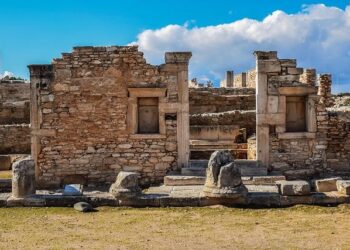In a landmark development for Romania’s political landscape, a pro-European candidate has secured a historic victory, signaling a decisive shift toward deeper integration with the European Union. This unprecedented win underscores the electorate’s growing support for reformist policies and closer ties with Western institutions, amidst a backdrop of ongoing domestic challenges and regional geopolitical tensions. The outcome of this election not only reshapes Romania’s future direction but also sends a clear message about the country’s place within the broader European framework.
Romania’s Shift Toward Europe Signals New Political Era
Romania’s recent elections mark a decisive pivot toward deeper integration with the European Union. The victory of the pro-European candidate underscores widespread public support for policies aimed at reinforcing democratic values, increasing transparency, and accelerating economic reforms aligned with the EU agenda. Political analysts highlight that this shift could redefine Romania’s role on the European stage, amplifying its voice in critical decisions surrounding regional security, energy independence, and migration management.
Key implications accompanying this transformation include:
- Strengthening rule of law: Enhanced judicial reforms to tackle corruption and improve governance.
- Economic modernization: Boosting foreign investments by creating a more business-friendly environment.
- Geopolitical alignment: Closer cooperation with EU partners on defense and climate initiatives.
| Aspect | Previous Era | New Political Era |
|---|---|---|
| EU Relations | Ambivalent, cautious | Proactive, collaborative |
| Governance | Frequent political instability | Focus on reform and stability |
| Economic Focus | Domestic-driven | Integration with EU markets |
Analyzing the Impact of the Pro-European Victory on Domestic and Foreign Policy
The emphatic win of the pro-European candidate is poised to recalibrate Romania’s policy trajectory, both domestically and on the international stage. Domestically, this victory signals a renewed commitment to judicial reforms aimed at enhancing transparency and reducing corruption, which have long been thorny issues within the country. Additionally, social policies are expected to align more closely with European standards, addressing pressing concerns such as healthcare modernization and educational reforms. The government’s increased legitimacy could also accelerate the implementation of infrastructure projects funded by the European Union, stimulating economic growth and regional development.
On the foreign policy front, Romania is likely to deepen its integration within EU structures and strengthen alliances with key partners like Germany and France. This shift includes:
- Enhanced cooperation on climate initiatives and renewable energy projects under European Green Deal frameworks
- Stronger defense ties within NATO, as Romania positions itself strategically in response to regional security concerns
- Expanded diplomatic engagement with neighboring countries to foster stability in Eastern Europe
| Policy Area | Projected Impact |
|---|---|
| Judicial Reform | Accelerated anti-corruption measures |
| Economic Development | Increased EU funding utilization |
| Defense | Expanded NATO collaboration |
| Climate Policy | Commitment to EU Green Deal goals |
Strengthening Democratic Institutions Essential for Sustained European Integration
The recent triumph of Romania’s pro-European candidate signals a pivotal moment for the nation’s democratic landscape, underscoring the critical necessity of robust institutions in steering sustained integration within the European Union. As the country navigates this transformative era, strengthening transparency, judicial independence, and accountability emerges as key pillars in fostering public trust and aligning domestic policies with EU standards.
To capitalize on this momentum, policymakers must prioritize the following to solidify democratic resilience:
- Reform of the judicial system: Enhancing impartiality and efficiency through anti-corruption initiatives.
- Empowerment of civil society: Facilitating active citizen participation and watchdog functions.
- Media freedom protection: Ensuring diverse and independent information dissemination.
| Institutional Aspect | Current Status | Recommended Action |
|---|---|---|
| Judiciary | Ongoing reforms, variable independence | Accelerate anti-corruption measures |
| Civil Society | Growing engagement but limited resources | Increase funding and legal protections |
| Media Landscape | Fragmented with ownership concentration | Promote pluralism and safeguard press freedom |
Key Takeaways
The historic victory of Romania’s pro-European candidate marks a significant turning point for the country’s political landscape and its future within the European Union. As Romania navigates the challenges ahead, this decisive electoral outcome reinforces the nation’s commitment to democratic values and closer integration with Europe. Observers will be watching closely to see how this mandate translates into policy and reform in the coming months.















